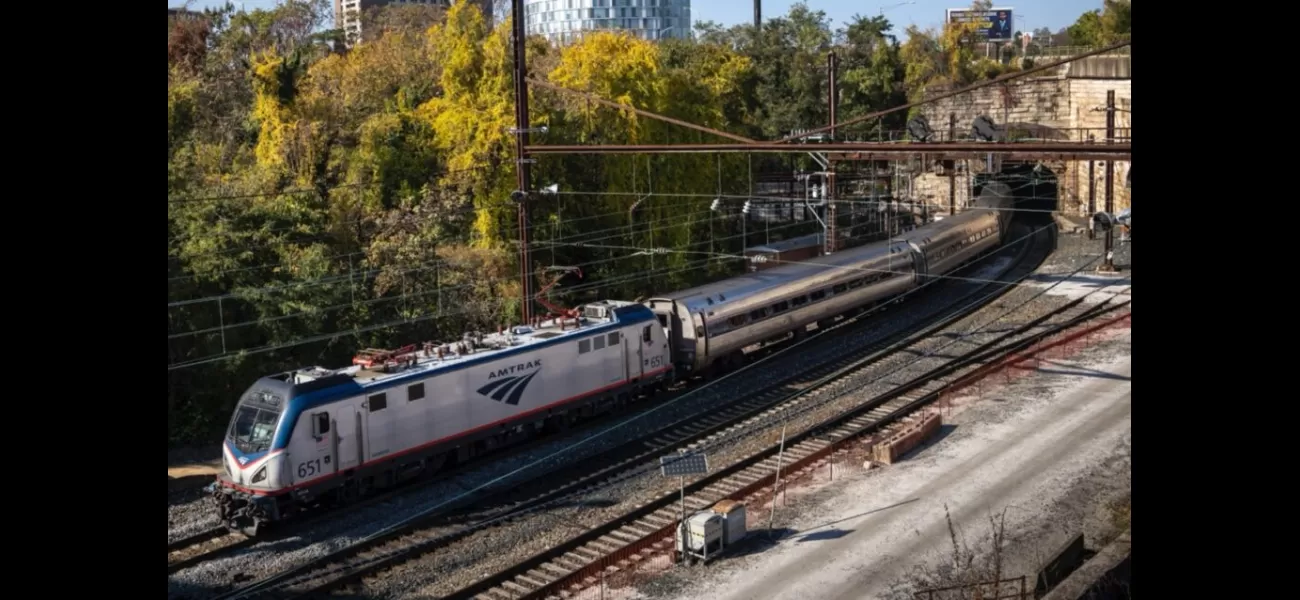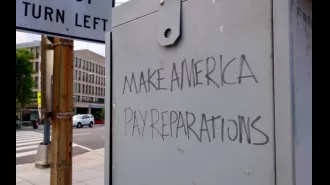Baltimore residents filed civil rights complaint to halt Frederick Douglass Tunnel construction.
A $6 billion plan to replace the 150-year-old Baltimore and Potomac Tunnel, a key route for Amtrak's northeast corridor.
May 7th 2024.

The residents of a charming and historic neighborhood in West Baltimore were recently disheartened by the news of a proposed Amtrak tunnel that was to be named after the renowned Black abolitionist and writer, Frederick Douglass. Fearing the negative impact it could have on their community, they decided to take action and file a complaint in the hopes of putting a stop to the construction.
According to the residents of Reservoir Hill, the proposed Frederick Douglass Tunnel Program would disproportionately affect the Black and low-income members of their community. As the president of the Reservoir Hill Association, Keondra Prier expressed her disappointment by stating, "To name a tunnel and a project after someone who fought for freedoms, truth, and equality for all, and then have it cause harm to our community, is truly disheartening."
In order to seek justice, the Reservoir Hill Association sought the help of New York University School of Law's Civil Rights and Racial Justice Clinic. Under Title VI of the Civil Rights Act of 1964, federal agencies have the power to intervene and prevent the implementation of programs that have a discriminatory impact. With the assistance of the clinic, the association is urging the Department of Transportation to launch an investigation into the racial disparities of the Frederick Douglass Tunnel Program.
Their complaint also demands that Amtrak halts the construction of the tunnel and a ventilation building that is planned to be built in the neighborhood. The proposed $6 billion project aims to replace the outdated Baltimore and Potomac Tunnel, which has been in use for over 150 years and services major cities along the northeast corridor such as Boston, New York, Philadelphia, Baltimore, and Washington D.C. Due to its deteriorating condition, trains are forced to slow down to 30 mph, causing significant delays. However, the residents of Reservoir Hill have a different perspective.
As the proposed tunnel would now pass beneath West Baltimore neighborhoods, including Reservoir Hill, Penn North, and Midtown-Edmondson, the community would be subjected to issues such as noise pollution, solid waste, and rodents. The complaint also alleges that the construction would have a devastating impact on Reservoir Hill, leading to the destruction of homes, businesses, and even houses of worship. The proposed ventilation facility is planned to be built across the street from Dorothy I. Height Elementary School, further raising concerns among parents and neighbors. Carson Ward, the chair of the Association's BP Working Group, expressed his outrage by saying, "To think that they would even consider building a facility like this across from an elementary school shows the level of disregard that Amtrak has for our community."
The parents of students attending the elementary school also voiced their concerns, with one parent highlighting the high asthma rates among city kids. Darryl McClain stated, "Baltimore City's kids have a higher rate of asthma compared to every single surrounding county. We continue to bear the brunt of whatever is needed commercially for the city in our neighborhood, while other neighborhoods are protected. This project is just one of many steps that we are forced to take, and we cannot have a ventilation facility across the street from the elementary school." These concerns were validated by the Maryland Department of Health, which reported that over 33% of high school students in Baltimore have been diagnosed with asthma, compared to the statewide rate of under 26%.
The opponents of the construction are now calling for the Department of Transportation to intervene and facilitate a discussion between Amtrak and the affected community members. The complaint also claims that community meetings have not been effectively advertised, and Amtrak officials have been unresponsive. Prier emphasized the importance of community engagement by saying, "Under the law, Amtrak is supposed to involve the community in a transparent and clear manner, where everyone's voice is heard. They need to justify why they chose a certain location and come up with a plan to benefit everyone. But if you ask anyone along the alignment, they will tell you that none of these things have been accomplished."
The residents of Reservoir Hill are also hoping that Amtrak will be forced to find an alternative location for the tunnel and consult with the community on the design of the building. With the demolition set to begin in February 2024, they are determined to fight for their rights and ensure that their community is not unjustly impacted by the construction of the Frederick Douglass Tunnel.
According to the residents of Reservoir Hill, the proposed Frederick Douglass Tunnel Program would disproportionately affect the Black and low-income members of their community. As the president of the Reservoir Hill Association, Keondra Prier expressed her disappointment by stating, "To name a tunnel and a project after someone who fought for freedoms, truth, and equality for all, and then have it cause harm to our community, is truly disheartening."
In order to seek justice, the Reservoir Hill Association sought the help of New York University School of Law's Civil Rights and Racial Justice Clinic. Under Title VI of the Civil Rights Act of 1964, federal agencies have the power to intervene and prevent the implementation of programs that have a discriminatory impact. With the assistance of the clinic, the association is urging the Department of Transportation to launch an investigation into the racial disparities of the Frederick Douglass Tunnel Program.
Their complaint also demands that Amtrak halts the construction of the tunnel and a ventilation building that is planned to be built in the neighborhood. The proposed $6 billion project aims to replace the outdated Baltimore and Potomac Tunnel, which has been in use for over 150 years and services major cities along the northeast corridor such as Boston, New York, Philadelphia, Baltimore, and Washington D.C. Due to its deteriorating condition, trains are forced to slow down to 30 mph, causing significant delays. However, the residents of Reservoir Hill have a different perspective.
As the proposed tunnel would now pass beneath West Baltimore neighborhoods, including Reservoir Hill, Penn North, and Midtown-Edmondson, the community would be subjected to issues such as noise pollution, solid waste, and rodents. The complaint also alleges that the construction would have a devastating impact on Reservoir Hill, leading to the destruction of homes, businesses, and even houses of worship. The proposed ventilation facility is planned to be built across the street from Dorothy I. Height Elementary School, further raising concerns among parents and neighbors. Carson Ward, the chair of the Association's BP Working Group, expressed his outrage by saying, "To think that they would even consider building a facility like this across from an elementary school shows the level of disregard that Amtrak has for our community."
The parents of students attending the elementary school also voiced their concerns, with one parent highlighting the high asthma rates among city kids. Darryl McClain stated, "Baltimore City's kids have a higher rate of asthma compared to every single surrounding county. We continue to bear the brunt of whatever is needed commercially for the city in our neighborhood, while other neighborhoods are protected. This project is just one of many steps that we are forced to take, and we cannot have a ventilation facility across the street from the elementary school." These concerns were validated by the Maryland Department of Health, which reported that over 33% of high school students in Baltimore have been diagnosed with asthma, compared to the statewide rate of under 26%.
The opponents of the construction are now calling for the Department of Transportation to intervene and facilitate a discussion between Amtrak and the affected community members. The complaint also claims that community meetings have not been effectively advertised, and Amtrak officials have been unresponsive. Prier emphasized the importance of community engagement by saying, "Under the law, Amtrak is supposed to involve the community in a transparent and clear manner, where everyone's voice is heard. They need to justify why they chose a certain location and come up with a plan to benefit everyone. But if you ask anyone along the alignment, they will tell you that none of these things have been accomplished."
The residents of Reservoir Hill are also hoping that Amtrak will be forced to find an alternative location for the tunnel and consult with the community on the design of the building. With the demolition set to begin in February 2024, they are determined to fight for their rights and ensure that their community is not unjustly impacted by the construction of the Frederick Douglass Tunnel.
[This article has been trending online recently and has been generated with AI. Your feed is customized.]
[Generative AI is experimental.]
0
0
Submit Comment





